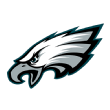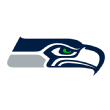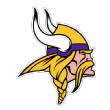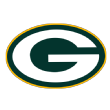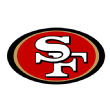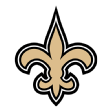Making sense of the 2019 NFC playoff race: Eight good teams for six spots

The NFC playoff picture is a beautifully muddled mess. Sunday saw the 49ers and Vikings hold serve in their divisional races by pulling out comeback victories, leaving three of the NFC's four divisions within one game at the top. The Saints reaffirmed their stranglehold on the South by all but eliminating the Buccaneers from playoff contention, then got help from the archrival Falcons when the suddenly dominant Atlanta defense stomped Kyle Allen and the Panthers.
By the time the Rams sent Bears quarterbackMitchell Trubiskyto the bench with a right hip injury on Sunday night,the NFC race was realistically down to eight teams. Each of our eight contenders has at least a 20% chance of making it to the postseason, per ESPN's Football Power Index (FPI). The eight other teams in the conference have combined playoff chances of just 2.5%, most of which comes from the 5-5 Panthers, who are at 1.4%.
Let's run through those eight teams and discuss what stands out in the NFC after Week 11. I'll start on the bottom of the list and begin with a team that might have essentially played a playoff eliminator Sunday night:
Jump to a team:
DAL | GB | LAR | MIN
NO | PHI | SF| SEA
Los Angeles Rams (6-4)
Chance to make the playoffs: 18.5%
If the season ended today: Out of playoffs
Tuesday is the one-year anniversary of what might go down as the stylistic peak of the Sean McVay era, the legendary 54-51 shootout between the Rams and Chiefs on Monday Night Football. That game was passing football on amphetamines in an environment in which it felt like either team was capable of scoring on every single snap.
Now, 363 days later, the Rams played out a game in which it seemed like both teams were more concerned about making a mistake than they were about scoring. Sunday's stultifying 17-7 win over the Bears is a credit to Wade Phillips' defense, which has turned things around after the Rams dealt most of their available draft credit line for cornerback Jalen Ramsey.
It's also a reminder of just how notably things have changed for Los Angeles. This time last season, the Rams were still living off outside zone and the play-action opportunities their core run concept created. Against those Chiefs, it was mostly the latter, as Jared Goff dropped back to pass 54 times against 21 rushing plays. Goff fumbled twice, but he finished with 413 passing yards and four touchdowns without throwing a pick.
On Sunday, the entire offense was flipped. The Rams used the "duo" run scheme so frequently that commentator Cris Collinsworth called it out in the middle of the game. McVay took the game out of Goff's hands after a dismal start against the Bears in 2018 and an ugly performance against the Steelers last weekend, running the ball on 34 of Los Angeles' 52 snaps on offense. Goff finished 11-of-18 for 173 yards with an interception, although a long touchdown to Josh Reynolds was wiped away by an illegal formation penalty.
That missing touchdown came off a play fake, and while that used to be the most devastating element of the Rams' offense, it's come and gone. In 2018, Goff led the league with 2,026 passing yards off play-action, more than 200 ahead of any other quarterback, adding 15 touchdown passes against just two interceptions. He was seventh in the league in passer rating on play-action at 114.5. This season, Goff has a 66.3 passer rating on play-action passes, worst in the NFL by nearly eight full points. He has thrown five interceptions with just one touchdown.
Even in the abbreviated sample against one of the league's best pass rushes, Goff underwhelmed. He did hit a pair of deep throws downfield, notably the near-touchdown pass to Cooper Kupp, but he looked lost for confidence in the pocket at times and continued to miss open receivers. He inexplicably whiffed high on what should have been an easy completion to Reynolds on a dagger concept. NFL Next Gen Stats suggested he had a 75% chance of completing this pass, which is remarkably high for a throw downfield. By those numbers, Goff has the largest negative gap between his actual completion percentage (60.3%) and his expected completion percentage (66.7%) of any quarterback in football with 200 attempts or more.
Goff isn't playing well, but to some extent McVay might have been forced to make changes by his personnel. In that Chiefs game a year ago, the only Rams starter who was missing from the lineup was Kupp, who had torn his ACL. On Sunday, after Robert Woods was a late scratch for personal reasons, the Rams were down five of their offensive starters. Several of the players who are left look totally compromised, including Todd Gurley and Andrew Whitworth, whose slide might be one of the least-reported but most-important stories of the 2019 season. Whitworth on Sunday committed his seventh holding penalty of the season, a stunning number from a superstar who committed just seven holds across his first two full seasons in Los Angeles.
It remains to be seen whether McVay wanted to use this philosophy for one week to try to beat a Bears team that tormented Goff in Chicago last season or if the Rams will go run-heavy and try to win with a few shot plays in the passing game. (The Bears destroyed Goff last December when they went with the 6-1 front on defense, which came full circle on Sunday when the Rams used the same front against Mitchell Trubisky.) With the Ravens coming to town next week, the Rams will likely want to keep the ball out of Lamar Jackson's hands and keep a devastating Baltimore offense on the sidelines, which would seemingly point toward the run.
The biggest game for the Rams might come against the Cowboys in Week 15. Los Angeles still has games it will want to win against the Seahawks (Week 14) and 49ers (Week 16), but its chances of winning the division are down below 2% at this point. The Rams' best chance of getting in is as a wild-card team, and a tiebreaker victory over the Cowboys could loom large if Dallas doesn't win the NFC East.
Philadelphia Eagles (5-5)
Chance to make the playoffs: 41%
If the season ended today: Out of playoffs
The Eagles nearly did it! There's no shame in losing to the Patriots, but Philadelphia has to be frustrated with how close it came and how little it was able to offer over the course of Sunday's 17-10 loss. The Eagles went up 10-0 after a 16-play drive, and despite handing the ball twice to the Patriots in plus territory during the second quarter, they were able to limit the Pats to three field goals on three trips inside the 25-yard line. After a trick play put the Pats up 17-10 in the third quarter, the Philly defense held and forced punts on each of New England's final six possessions.
What went wrong for the Eagles? They lost star right tackle Lane Johnson, whose absence has usually resulted in a drastic drop-off from Carson Wentz. Before Sunday, Wentz had posted a passer rating of 98.1 with his tackle on the field, but that mark fell to 79.8 with Johnson injured, suspended or taking a breather.
Johnson went down with a head injury in the second quarter and did not return. His last play was the extra point after the Dallas Goedert touchdown catch, which put the Eagles up 10-0. When Johnson was in the lineup, Wentz went 8-of-12 for 56 yards with zero sacks, the touchdown and a passer rating of 104.9. Afterward, Wentz was 12-of-28 for 158 yards with five sacks and a passer rating of 61.3. Replacement Halapoulivaati Vaitai struggled, giving up a second-half sack to Kyle Van Noy. Left tackle Jason Peters even missed a couple of snaps, which left Wentz down both of his tackles for a moment.
Even given the absences of Johnson, Alshon Jeffery, DeSean Jacksonand Jordan Howard against the league's best defense, you could have asked for more from Wentz. The former North Dakota State star fought the wind in Philadelphia and made a few wildly impressive throws, most notably the 29-yard strike out of his own end zone to J.J. Arcega-Whiteside. The desperate throw he launched toward the end zone on fourth-and-10 late in the game managed to find Nelson Agholor's hands, although the oft-criticized wideout failed to bring in what would have been a circus catch.
But after the touchdown, each of Philadelphia's eight subsequent possessions lasted no more than five plays. Wentz lost a fumble on a strip sack and missed a number of throws to open receivers, including an attempt to an open Zach Ertz on third down before the Agholor near-miracle. With the Eagles' running game in neutral, coach Doug Pederson asked Wentz to drop back 47 times, but Wentz completed only 50% of his passes and averaged 5.4 yards per attempt.
Do we hold Wentz to an unrealistic standard? The MVP candidate we saw in 2017 might be the best version of Wentz we ever see, in part because of where he succeeded. He was unsustainably great on third down that season, posting a Total QBR of 91.7 and posting a passer rating of 123.7, both of which led the league by significant margins and were virtually impossible to keep up. This season, Wentz has a QBR of 76.9 and a 96.3 passer rating on third down; good, but not otherworldly. The 2017 version of Wentz posted a 97.2 QBR and threw for 23 touchdown passes without a pick in the red zone; 2019 Wentz has an 81.7 QBR inside the 20 and ranks just behind Josh Allen in ninth.
As constructed, though, I'm not sure the Eagles can go far unless they get something closer to the superhero version of their quarterback. Their defense has been too inconsistent, ranking 31st in Football Outsiders' variance stat before Sunday's solid performance against the Pats. Philly was able to ride home-field advantage to the Super Bowl in 2017, but there's virtually no chance of the Eagles finishing with one of the top two seeds in the NFC. Their most obvious path in is by beating the Cowboys, who face the Patriots next week.
FPI gives Philly almost exactly a one-third chance of winning the East, owing to Dallas's one-game lead and tiebreaker edge over their divisional rivals. The Eagles badly need the Patriots to come through in Foxborough next Sunday.
Dallas Cowboys (6-4)
Chance to make the playoffs: 71%
If the season ended today: 4-seed, vs. Seahawks
There's a four-quarterback MVP race right now by Total QBR. Four passers have posted a QBR between 77 and 79, and the signal-caller with the most volume of those four is Dak Prescott. It's time to stop pretending that the Cowboys run their offense through Ezekiel Elliott or that Prescott needs his star running back to create throwing opportunities. This is Dak's offense, and the Cowboys are a better team for it.
Whether he was slowed by his holdout or just having a middling season, Elliott has been ordinary in 2019. While a fumble on Sunday was only his second fumble of the season after six a year ago, we haven't seen much burst from the highest-paid running back in football. He has just one run for more than 20 yards this season, a 27-yarder against Washington in Week 2. To contrast, Elliott had eight runs of 20 yards or more through 11 weeks last season.
You can survive without big plays if you're consistently churning out first downs, but again, Elliott has dropped off there. He has turned 23.7% of his runs into conversions, down from 26.2% this time last year. Elliott can still contribute as a receiver and pass-blocker, but the way the fateful drive against the Vikings stalled once the Cowboys handed the ball to Elliott twice was an exaggerated example of how this offense has worked in 2019.
Sunday was another game in which the Cowboys' running game did little. Facing a Lions teamthat ranked 20th in rush defense DVOA heading into the game, Elliott carried the ball 16 times for just 45 yards. If he might not be 100%, ailing No. 1 wideout Amari Cooper might not even be at 50%. Cooper caught just three of eight targets for 38 yards while playing 40 of Dallas's 71 offensive snaps.
None of that bothered Prescott, who went 29-of-46 for 444 yards and three touchdowns in the 35-27 win. Randall Cobb and Michael Gallup both posted 100-yard games, with Cobb seemingly getting open time and time again against Lions slot corner Justin Coleman. When the Cowboys needed to close out the game, they ran the ball with Elliott for no gain on first down and then wisely turned to Prescott on second down, who hit Blake Jarwin for a 23-yard completion on the final meaningful snap of the contest.
While everyone stumbles around to make excuses for why the Cowboys lead the league in offensive DVOA for other reasons, the reality is that Prescott is simply playing brilliantly. When you look at NFL Next Gen Stats, Prescott has been the anti-Goff. NGS estimates that Prescott should have completed 61.4% of his passes this season; Prescott is instead at 67.7%, with the 6.3% difference the third-largest in football behind Kirk Cousins and Russell Wilson. Prescott would even be higher if the Cowboys weren't dropping 4.4% of his passes, the fourth-highest rate in the league. (Cousins is at 3.1% and Wilson at 2.4%.)
Going back to Week 12 of 2018 for his most recent 16-game sample, Prescott leads the league in passing yards (4,968), is second in yards per attempt (8.5), third in passing touchdowns (32), and third in Total QBR (73.1) behind Patrick Mahomes and Wilson. He has been a superstar for the past year, and unless the Cowboys get in his way by insisting on running their offense through Elliott, Prescott is going to win them a division title.
If the Cowboys beat the Patriots next week, Prescott should gain his rightful place in the wide-open MVP race. Even if Dallas loses, though, the Cowboys are still in good shape to retain their title. They have three winnable home games left against the Bills (Week 13), Rams (Week 15) and Washington (Week 17). Winning those three would get them to nine victories and leave them in great tiebreaker shape within the East. Even if they were to lose to the Eagles in Philly in Week 16, beating the Bears in their one other road game would likely make the Cowboys division champs.
Seattle Seahawks (8-2)
Chance to make the playoffs: 84.2%
If the season ended today: 5-seed, at Cowboys
While I wrote last week about how the Seahawks are likely to decline over the rest of the season, it's almost impossible to imagine them missing the playoffs. No 8-2 team has ever missed the playoffs in the 17 years the NFL has spent under its current 32-team structure. FPI projects the Seahawks to finish 11-5, and just one 11-5 team (the Tom Brady-less 2008 Patriots) has failed to reach the postseason since 2002. It would take a catastrophic collapse for the Seahawks to miss out.
The Seahawks don't have a great point differential at plus-21, which doesn't bode well for the next six games, but they still have every chance of competing once they get to January. They have the third-worst point differential among the 28 teams since 2002 that have started 8-2. Some of the teams in their neighborhood have gone far in the playoffs, including a pair of Super Bowl winners in the 2015 Broncos (plus-39) and 2003 Patriots (plus-41). The latter Pats team faced a Panthers squad that was at plus-18 through 10 games that same season. If Russell Wilson stays hot, Seattle isn't going to be a team anybody wants to face in an elimination game.
Wilson is the favorite to win league MVP, but as much as the Seahawks need him to continue playing at his current level, they might be nearly as dependent upon Jadeveon Clowney. The former Texans star played one of the best games we've seen from any defender all season during last Monday's victory over the 49ers, arguably justifying the modest cost of acquiring himin one night.
Clowney has been on the field for 72% of Seattle's defensive snaps and 79% of opposing dropbacks this season. When you take a closer look at the unit's performance, Pete Carroll's defense has been a different animal with their star pass-rusher on the field:
The Seahawks have just two sacks in 88 dropbacks without Clowney on the field. With first-round pick L.J. Collier barely playing and Ziggy Ansah recording just one sack in seven games, Seattle is dependent upon Clowney to keep its pass rush afloat. Defensive coordinator Ken Norton benched Ansah at one point during Monday's game to insert linebacker Shaquem Griffin, who had played just eight defensive snaps since Week 1 of 2018. The Seahawks badly need Ansah (or someone else) to give Clowney some support.
Beating the 49ers last week gave the Seahawks a much clearer path toward possibly winning the NFC West. Winning the division might mean more to the Seahawks than any other team in football. Every time I've studied home-field advantage, they have come out at or near the top of the rankings, which isn't a surprise.
The difference in their playoff record has been even more dramatic. Since the Seahawks moved into CenturyLink Field in 2002, they've gone 10-1 at home during the postseason but just 2-8 on the road. Wilson's two playoff wins on the road have required two catastrophic disasters for the opposing team: Robert Griffin's knee injury in the 2012 playoffs, and Blair Walsh's miss from 27 yards out with 26 seconds left in the 2015 postseason.
Even after the win over the 49ers, FPI projects the Seahawks as more likely to finish as a wild-card team (53.3%) than to host even one postseason game (28.8%). The Seahawks still have a 10.9% chance of finishing with the No. 1 seed and running the postseason through Seattle. Every team's best chance of making it to the Super Bowl involves staying at home during the playoffs. It's even more important for the Seahawks, who play three of their final six regular-season games at home.
They realistically need four more wins to have a meaningful chance of finishing with that 1-seed. While Wilson & Co. are set to face the league's third-toughest schedule over the remainder of the season, the good news is that it includes a number of possible NFC foes who would be competing with them for the top seed, including the Vikings and 49ers. There's a chance that the 49ers-Seahawks rematch, which takes place in Week 17, could decide the division, hand out a bye and split the difference between the first seed in the NFC and the fifth. Thankfully for the Seahawks, Round 2 takes place in Seattle.
Minnesota Vikings (8-3)
Chance to make the playoffs: 92.9%
If the season ended today: 6-seed, at Saints
Does a rematch of the Minneapolis Miracle sound fun? The Vikings would make a trip to New Orleans to play the Saints under the current playoff picture, and they might again be a bad matchup for the likely NFC South champs. The Vikings have a weakness Drew Brees might not be able to exploit, although Denver'sBrandon Allen and Courtland Sutton were unexpectedly able to attack Mike Zimmer's defense on Sunday.
With their corners struggling, there's just nothing the Vikings seem capable of doing to stop deep throws this season. They rank 30th in QBR allowed on deep passes at a staggering 97.0, with only the Raiders and Bengals worse. On Sunday, the Broncos hit their first five deep attempts for 189 yards, including a 38-yard lob from Sutton to Tim Patrick. The Vikings came up with three stops on the final drive, but the Broncos got out to their 20-0 lead because Minnesota kept giving up huge plays downfield.
This isn't a hallmark of the Zimmer defense. In 2018, the Vikings were eighth in QBR allowed against deep passes. Xavier Rhodes& Co. were 13th in 2017 and first in 2016. Minnesota has cornerbacks with a track record of at least some success. Those corners have been a disaster this season, and if Harrison Smith's hamstring injury costs him time, things are only going to get worse.
The Vikings became the first team in 97 tries to win a regular-season game after going down by 20 points or more at halftime, and while they deserve a lot of credit for not simply writing the game off as a bad day and disappearing in the second half, the Broncos helped the Vikings back into the game. After the Broncos went up 20-0 in the second quarter and Ameer Abdullah fumbled the ensuing kickoff to Denver, the Broncos took over with the untested Allen at quarterback and one minute to go from the 17-yard line. If there was ever a time to be conservative and try to run the ball while getting points on the board, this was it. Allen threw an interception on a contested pass on the first play of the drive.
On the other hand, when the Broncos needed to get aggressive, they stayed conservative. After the Vikings had made it 23-20 early in the fourth quarter with two long touchdown drives, the Broncos moved into field goal range and faced a third-and-7 from the Minnesota 29-yard line. The Vikings played two deep safeties and dared the Broncos to run and Denver took the bait, with Devontae Booker going for 4 yards. Instead of going for it on fourth-and-3, the Broncos tried a field goal that would have only incentivized the Vikings to try to score a touchdown, although Brandon McManus missed the kick anyway.
Both coaches made mistakes late. Vic Fangio challenged a pass interference call just before the two-minute warning, which is roughly the football equivalent of buying something useless in the airport with the foreign currency you have left at the end of a trip before you board your flight home. It went as well as you would have expected. Zimmer responded by taking a timeout with the Broncos frantically trying to get set after an Allen zone-read keeper with 10 seconds to go, a move that seemed to puzzle his own players and likely ended up giving the Broncos an extra play with two seconds left to go.
It's good to see the Vikings win a game in whichDalvin Cook was bottled up, given that the star halfback finished with only 26 rushing yards on 11 carries. It basically locks them into a playoff berth, either via the wild card or by winning the North.
After the bye, though, they travel to Seattle to face a quarterback who has been torching defenses downfield in Wilson. They might get to face Lions quarterbackJeff Driskel in lieu of Matthew Staffordin Week 14, but the following week the Vikings will see Philip Rivers, who throws downfield as often as any quarterback in football, before a critical rematch with the Packers. Zimmer has to hope that the week of rest does something to heal his struggling corners for the run-in and the playoffs that follow.
Green Bay Packers (8-2)
Chance to make the playoffs:95.5%
If the season ended today: 2-seed, first-round bye
The Packers are a strange team to figure out. We know they're good, if not quite at the top tier of teams. They were eighth in DVOA heading into this week's bye and ranked ninth in FPI. They're 4-1 in one-score games and would be 5-1 if I included eight-point wins and losses in that category, which was their margin of victory against Carolina last Sunday. They've played a tough schedule that gets easier over the remainder of the season, although four of their final six are on the road, including trips to face the 49ers and Vikings. The latter game should be crucial in an NFC North race the Packers lead.
Figuring out which element of this team is going to carry the Packers to victory from week to week, though, can be frustrating. It looked like the defense was going to carry them as Aaron Rodgers grew comfortable in Matt LaFleur's new offense, but Mike Pettine's defense has faded after a hot start.
The Packers ranked second in points per drive allowed and fourth in expected points generated per drive on defense during the first three weeks of the season. Since then, they are 27th in points per drive and 29th in EPA per drive. The pass defense has allowed opposing passing attacks to convert 43.6% of their attempts into first downs, comfortably the highest rate in the league over that time frame. Preston Smith and Za'Darius Smith have continued to trade off big games, but it has been pass pressure or bust for the Packers.
If you're looking to be optimistic about the Packers' defense, I'd start with their schedule, as they played what DVOA deemed as the league's toughest slate of opposing offenses over the first 10 weeks of the season. After returning from the bye, they're projected to face Jimmy Garoppolo, Daniel Jones, Dwayne Haskins, Mitchell Trubisky, Kirk Cousins and Matthew Stafford. While Cousins and Stafford are having career years, that's not a particularly scary group of passers.
The Green Bay run defense has been the team's biggest weakness, with the Packers ranking 25th in DVOA through 10 weeks and their defensive line finishing dead last in adjusted line yards. Again, though, the schedule is generally friendly; the Packers face only one top-15 rushing offense by DVOA over the remainder of the season in the Vikings. (While the 49ers have accrued plenty of rushing volume, they were 16th in rush offense DVOA through Week 10, with the Football Outsiders stat not yet updated for Week 11's performances.)
If anything, the offense has been even more confusing. It ranks 25th in variance, pointing out just how inconsistent it has been from week to week. The Packers' three best games of the season came in Weeks 5-8, when No. 1 wideout Davante Adams was sidelined by turf toe. It seemed like Rodgers had settled in with back-to-back excellent performances against the Raiders and Chiefs, but the entire offense laid an egg against the Chargers, while the running game carried the day in the snow against the Panthers before the bye.
That running game has generally been good, although the team has seemingly committed to splitting reps between Aaron Jones and Jamaal Williams when both backs are available. The situation reminds me of the last Super Bowl run from the Packers. One of the popular narratives from that year was that they finally balanced their offense by turning over the starting role to rookie James Starks. After carrying the ball just 29 times during the regular season, he took the ball 81 times during the four-game playoff run. I'm skeptical of Starks' actual impact, given that he averaged only 3.9 yards per carry and ran for 16 first downs, but the likes of Brandon Jackson and Dimitri Nance weren't doing much, either.
I bring up that example because the Packers might be able to accelerate their offense by turning things over to one back. Unsurprisingly, my choice there is Jones, who has been dynamic as a runner and receiver this season. The drop-off in the offense when Jones isn't on the field is dramatic.
In 180 snaps with him on the field and Williams on the sideline, the Packers have averaged 0.22 EPA per play, which would make them the best offense in football on a play-by-play basis. In 127 snaps with Williams on the field and Jones sitting out, though, the Packers have actually been a net negative on offense at -0.05 EPA per play, which is the equivalent of the 2019 Giants, who rank 25th in expected points added. If one back makes you the best offense in football and the other back makes you the Giants, I would go with the first guy.
It's fair to suggest that the Packers are so impressive with Jones on the field in part because they rest him so frequently. In the games in which Williams has been healthy, Jones has played just under 55% of the offensive snaps. If the Packers were to play Jones for 80% or more of their offensive snaps, it's likely that he would be less efficient with the increased usage rate.
At the same time, even some drop-off from Jones would still likely produce a more effective offense than that same offense with Williams. As much as the organization has insisted that Jones needs to split time -- a stance that existed before LaFleur was hired -- the Packers are simply a different offense with Jones as the primary back. The Packers' best chance of winning a Super Bowl is by turning the vast majority of the snaps over to Jones when things matter most. The obvious point to make that move might not be the beginning of the postseason; given that it could decide the division, I'd lean toward the Week 16 game at Minnesota.
San Francisco 49ers (9-1)
Chance to make the playoffs: 95.8%
If the season ended today: 1-seed, first-round bye
A questionable call helped spur the 49ers to a come-from-behind win against the Cardinals on Sunday. With the 49ers facing a third-and-3 in field goal range down 26-23, Jimmy Garoppolo threw a quick out to Ross Dwelley, who was having the game of his life against the Cardinals and their tragically bad tight end defense. Dwelley caught the pass at the sticks and was given a first down on the field. The referees reviewed the call, and despite replays suggesting Dwelley was short of a first down, the call was upheld.
On the next play, Garoppolo found Jeff Wilson matched up in coverage against pass-rusher Chandler Jones and hit the running back for a 25-yard touchdown. Instead of facing a Chase McLaughlin field-goal try and a would-be game-winning drive from Kyler Murray, the 49ers took the lead, forced a fumble and then added a ridiculous defensive touchdown on the final play of the game strictly to lead "Bad Beats."
Garoppolo finished the day with a career-high 424 passing yards and four touchdown passes, marking the second time in three weeks the 28-year-old has thrown for four scores against the Cardinals. With the QB leading his team to a fourth-quarter comeback win despite missing left tackle Joe Staley, halfback Matt Breida, star tight end George Kittle and getting only limited snaps from top wideout Emmanuel Sanders, you could argue that this was a foundational game for Garoppolo in his 19th career start.
That wouldn't be entirely accurate, though. He threw two interceptions, one that was an inexplicably bad decision in the red zone, and the other that was a pass thrown behind an open Dwelley and caught on a deflection. Both were on third down in situations when the 49ers would have likely scored points if Garoppolo had made a better decision. Owing to those two critical mistakes and Arizona's status as one of the league's worst pass defenses, Garoppolo finished the day with a QBR of 55.3, belowJeff Driskel and Sam Darnold.
On a macro level, it's becoming clear that teams are willing to sell out to stop San Francisco's running game and dare Garoppolo to beat them, a sign that they don't see him as the biggest threat the 49ers can offer. Despite getting out to an early 10-0 lead, the Cardinals ran eight men or more into the box on eight of San Francisco's 19 running plays Sunday; that 42.1% rate was the fourth-highest in the league. Since the 49ers ran the ball for 232 yards and five touchdowns in that blowout win over the Panthers, they've collectively run the ball 77 times for just 222 yards and no touchdowns. Kyle Shanahan's offense has generated first downs on just 10.4% of their runs over that time frame, the lowest mark in the league, while facing run defenses that rank 18th (Seahawks) and 21st (Cardinals) in DVOA.
Garoppolo took 21 dropbacks with seven or men in the box Sunday, owing to how frequently the 49ers used Kyle Juszczyk in the passing game and how concerned the Cardinals were with stopping the run. Garoppolo was tied with former teammateTom Brady for the league lead in that category this week. If defenses are going to load up the box, Shanahan will encourage his quarterback to throw. It will obviously be easier once the team gets Kittle, a star as both a blocker and receiver, back into the fold.
At the same time, we forget just how inexperienced Garoppolo still is, given that it's his sixth season in the league. Sunday marked his 20th career start, 18 of which have come under Shanahan with the 49ers. He left injured in two of those starts, so this is just his 18th complete game as an NFL quarterback. He's started as many games in the NFL as Darnold. It's still too early to draw any grand conclusions about Jimmy G when he hasn't even thrown 700 passes at the professional level.
If teams continue to slow down the running game, more of the load is going to fall on Garoppolo. As good as the defense has been, history says they won't be able to keep up their pass rush as the season goes on. The defense has relied heavily on takeaways, and while they were able to force the two late fumbles, one of them was essentially a gift on a laterals play. Arizona gashed the 49ers for 5.4 yards per rush, and while Murray threw for only 150 yards on 33 attempts, those numbers don't include 72 yards of pass interference penalties committed by Richard Sherman, the most penalty yards for any player in a game all season.
Even given the interceptions Sunday, Garoppolo did enough to win. Things are about to get tougher. He faces three above-average pass defenses over the next three weeks in the Packers, Ravens and Saints, before a home game against the suddenly-spicy Falcons defense. The Niners finish up with two crucial games in the West, home against the Rams and then north for the season finale against the Seahawks.
New Orleans Saints (8-2)
Chance to make the playoffs: 99.1%
If the season ended today: 3-seed, vs. Vikings
While the Saints are in third in the NFC behind the 49ers and Packers (who hold the tiebreaker over the Saints by virtue of a superior record in the conference), FPI actually projects New Orleans as the most likely NFC team to make the playoffs and have the highest expected seeding in the postseason. The 49ers have a better chance of finishing as the top seed, given that they're at 31.4% in FPI's simulations in comparison to the Saints at 28.4%, but Shanahan's team also loses its division lead and falls into a wild-card spot 30.8% of the time.
The Saints, on the other hand, have greater than a 98% chance of winning the South with six games to go, meaning that there's virtually no chance they'll have to settle for a wild-card berth. They're huge favorites to finish as the third seed, which is where they land in 36.1% of FPI's simulations. The 3-seed would give the Saints a home game in the wild-card round and a possible conference title game at home if the 1-seed loses in the divisional round.
After blowing out an overmatched Bucs teamSunday, the Saints can win the division outright by Week 13 by beating the Panthers and Falcons over the next two weeks. That would push Sean Payton's team to 10-2 in advance of what could be a battle for the top seed at home against the 49ers and Shanahan, whose offense scored 38 points the last time he ran through the Superdome in 2016. The Saints finish their home slate against the Colts before road games against the Titans and Panthers to end the season.
Given the injuries on this roster and the dominant position from which the Saints are operating, Payton can pay more attention toward getting his players healthy than most other coaches down the stretch. There's no reason, for example, to rush star corner Marshon Lattimore back from a hamstring injury. While that was already true, it had to put Payton's mind at ease to see oft-burned slot corner P.J. Williams excel in Lattimore's role on Sunday against Bucs star Mike Evans, with Williams holding Evans to four catches and 69 receiving yards on eight targets, 49 of those yards coming on the final two meaningless drives. Williams even finished the game with a pick on an attempted fade in the end zone, one of four Saints interceptions on the day.
This was a relatively quiet game for Drew Brees against an eminently torchable Bucs secondary, which was surprising. Brees went 28-of-35 and threw three touchdown passes, but he averaged only 6.5 yards per throw against a defense that had been allowing 7.7 yards per attempt before Sunday. It was certainly a good performance -- he finished with the third-best passer rating (122.4) and fifth-best Total QBR (85.8) of the day -- but this is the sort of defense he typically gashes for huge numbers.
Last week, I mentioned that Brees had struggled in limited reps under pressure this season. Likewise, he hasn't yet looked great throwing deep. On passes traveling 16 or more yards downfield, Brees has gone just 7-for-17 with two interceptions, resulting in both a passer rating (44.9) and Total QBR (15.6) well below league average.
I'm not too concerned for a few reasons. The sample is extremely small. The Saints have no reason to tax Brees' arm when he may realistically have only a certain number of deep bullets left at age 40. And when you consider that he is completing more than 75% of his passes, he doesn't need to throw deep. This is more just in the things to monitor category than something to seriously get concerned about.
The only other thing that comes to mind is the lack of a second pass-rusher for this team behind Defensive Player of the Year candidate Cameron Jordan. The Saints shipped off two first-round picks to move up for Marcus Davenportin the 2018 draft, but after racking up three sacks across the first seven games of the season, his role has diminished. Davenport played nearly 74% of the defensive snaps through the Bears game, but over the past three games he has been on the field for only about 47% of snaps, including a season-low 34% against the Bucs on Sunday. The second-year end hasn't been on the injury report, so it's curious to see the team reduce his role at a time when you would be hoping to see Davenport accelerating and emerging as a star.
These are minor issues for arguably the league's deepest team. The Saints are going to be a formidable opponent, regardless of whom they play in the playoffs or where the game takes place. The rest of their season is really just about trying to pry the top seed away from the 49ers and getting guys healthy for January.


